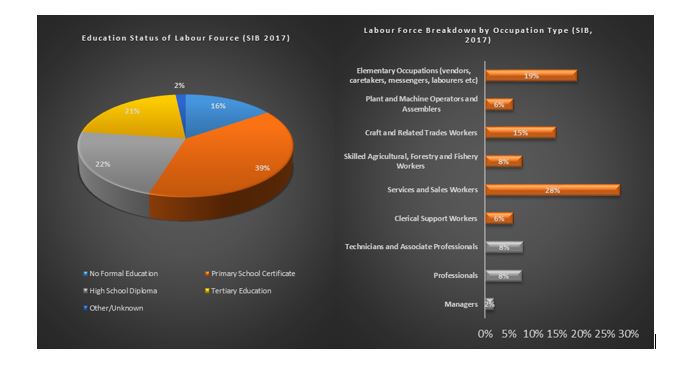- Submit News
- 501-666-6726
- [email protected]

One dead, one critical in Orange Walk shooting
September 30, 2018
Orange Walk murder victim identified
September 30, 2018Posted: Sunday, September 30, 2018. 7:11 am CST.
Poor people need the same robust reality checks. It must be clear to them that a poor person in their parallel context can become financially stable, even wealthy, through education, entrepreneurship, and hard work. Not once, not twice, but sufficiently reproduced to convince that such an outcome is the product of deliberate choice(s) as opposed to good fortune and chance. Sociologists refer to this ability to see a future outside of poverty as the “capacity to aspire”.
Persons submerged in a reality where barely surviving is the only apparent option do not see the full scope of their alternatives to poverty. They are stuck in an “aspiration trap”. This is a desperately dangerous thing, not being able to dream.

In Belize, a typical household will spend approximately $13,000 or more per year (HES, 2008) for basic a basket of goods and services: food, shelter, utilities, transport. A person with tertiary level education earns on average just about $2000 per month (SIB, 2017). This means that an “educated” person can expect to consume more than half their income on surviving. The balance of their budgeting exercise then is counting cents in the dollar, divining how to afford healthcare and basic luxuries like dining out, occasional travel and a decent four-cylinder car.
This is the manifestation of the dream that higher education is the key to a better life. However, just approximately 63% of students on average actually complete secondary school (MOE, 2016). This means that more than a quarter of persons entering the education system will not progress far enough to have a fair chance at this dreary excuse for the Belizean dream. The current composition of the labor force reflects this much – around 77% of persons working today have only a high school diploma and work in trades that do not require much formal education.
This reality, coupled with the fact that higher education for persons born into poor families is cost-prohibitive, makes it discouragingly difficult for at-risk youths to believe that they can turn their lives around and be productive citizens. It is not enough to say, “Stay in school and get good grades”, that has to translate into something meaningful in the real world to sustain the dream.
Then there is the counterfactual: the small few who capture wealth regardless of education. Not much of their stories are publicly available – their setbacks and subsequent triumphs not visible to the average citizen. However, observation reveals some common traits among the wealthy in Belize: political connection, asset (land) inheritance – often time as a function of political connection, and in some instances, regrettably, dealings in drugs and nefarious ventures.
Of course, there are those who succeed by way of persistence and business excellence but their stories are not as ubiquitous. Poor persons struggling to balance the cost of food and school fees more often witness the “success” of politicians and the politically connected. This is unavoidable because the “political elite” controls the life resources poor and working class people rely on to survive, like public health care, education subsidies, scholarships, public loans, and housing grants. So not only do poor persons fail to see a clear path to wealth and financial sustainability by traditional means such as education, but they see also a countervailing story of progress and promotion by way of political loyalty and association.
We are in a State of Emergency. A State of Emergency is a situation – one marked by disaster, civil unrest or armed conflict. A State of Emergency is not a solution. It is a declaration that things are so unusually difficult that the government must take extraordinary measures to contain conflict, measures that would ordinarily be unfair or undemocratic.
A State of Emergency will not in itself resolve a problem, but rather, when the problem is resolved the State of Emergency ends. This is important because at the heart of the problem is the poverty that people face in Belize. Not just a poverty of material means, but more so the poverty of opportunities for meaningful change.
Our people need unconditional access to public resources for their development based on their legitimate needs and competitive value, and not on who they vote for or support in party politics. The publication of a roster of land available throughout the country and a transparent application process to purchase at concessional rates for qualified citizens would be a good first step.
Divorcing the Prof and Tech scholarship process from political vetting and transferring its management to a public-private run committee is another idea. Actually upholding the law and declaring assets and liabilities with the Integrity Commission to prevent private enrichment with public assets and dispel the notion that politics is a profit-making venture.
These are a few ways and, indubitably, there are more and better ideas out there to bolster confidence in the system and help build hope for the poor. Political leaders and the social elite can ill-afford to ignore the importance of creating real opportunities for our people, giving space to have legitimate dreams because the alternative to this is simply more of our current nightmare.
Questions or comments on this article? Email me at [email protected]
The views expressed in this article are those of the writer and not necessarily those of Breaking Belize News.
Advertise with the mоѕt vіѕіtеd nеwѕ ѕіtе іn Belize ~ We offer fully customizable and flexible digital marketing packages. Your content is delivered instantly to thousands of users in Belize and abroad! Contact us at mаrkеtіng@brеаkіngbеlіzеnеwѕ.соm or call us at 501-612-0315.
© 2018, BreakingBelizeNews.com. Content is copyrighted and requires written permission for reprinting in online or print media. Theft of content without permission/payment is punishable by law.



































































Comments